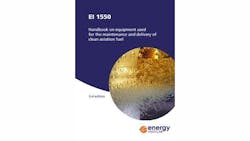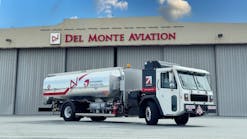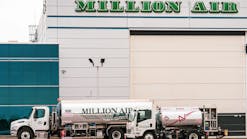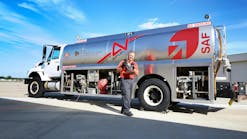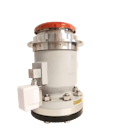Energy Institute Revises Handbook On Aviation Fuel Cleanliness
The Energy Institute has published EI 1550 Handbook on equipment used for the maintenance and delivery of clean aviation fuel (2nd edition), updating one of the key information resources for the aviation fuel supply industry. The first edition, published in 2007, became one of the most widely distributed EI publications and was cited by the International Civil Aviation Organization in its Doc 9977 Manual on civil aviation jet fuel supply.
The second edition continues to provide an overview of the technical requirements from the series of EI aviation fuel filter specifications, which is specifically intended for filter users (rather than equipment manufacturers), and it goes on to define good practice in the implementation and operation of filtration systems.
The updated EI 1550 handbook has been produced to take into account key developments in aviation fuel filtration in recent years. A significant development to the publication is the provision of new information on the measurement and monitoring of the differential pressure across a filter vessel. This is the primary means by which a filtration system alerts an operator to a fuel contamination event (by particulate matter/free water), or the failure of a filtration system. This critical activity has been explained in some detail, to provide an educational resource for use by operating companies.
In addition, five completely new chapters have been added which cover:
- differential pressure: its measurement, monitoring and correction
- de-rating filter monitor vessels with blank/dummy elements and filter/water separators with blinds/caps
- filtration system installations (fixed facilities)
- management of change
- manufacturer’s model codes for filter elements
The information provided in EI 1550 has been drawn from, and reviewed by, filter manufacturers, global operators and other leading industry specialists, and is closely aligned with the requirements of operational standards such as ATA 103 (published by Airlines for America) and Joint Inspection Group (JIG) Standards.
This second edition will assist anyone responsible for designing, purchasing, operating, maintaining or inspecting aviation fuel filtration systems, whether they are positioned at refineries, in distribution systems or at airports.
EI 1550 Handbook on equipment used for the maintenance and delivery of clean aviation fuel
2nd edition; ISBN: 978 0 85293 702 0
Price: £165.00 (EI and JIG members receive a 50% discount)
Discounts are also available for bulk orders
Order online at www.energypublishing.org
For further information, please contact:
Katie Crabb, Communications Manager, Energy Institute
t: +44 (0)20 7467 7173, e: [email protected]
The Energy Institute (EI) is the leading chartered professional membership body for the energy industry, supporting over 20,000 individuals working in or studying energy and 250 energy companies worldwide. The EI provides learning and networking opportunities to support professional development, as well as professional recognition and technical and scientific knowledge resources on energy in all its forms and applications. The EI’s purpose is to develop and disseminate knowledge, skills and good practice towards a safe, secure and sustainable energy system. A registered charity, the EI serves society with independence, professionalism and a wealth of expertise in energy matters. For more information, please visit www.energyinst.org
Each year the EI undertakes a focused technical work programme that comprises original independent research and investigations, technical responses to legislation and regulation, workshops and seminars to provide the international energy industry with information and guidance on relevant technical issues. This work is defined by the EI’s Scientific and Technical Committee and is supported by the EI’s Technical Partners. The results of this work are made available through technical publications and events for the purpose of disseminating guidance and good industry practice as widely as possible. For the full range of EI technical publications, please visit: www.energypublishing.org
For over 50 years the EI has provided publications for use by the international aviation fuel handling industry, and maintains a portfolio of 26 titles intended to assist in the maintenance of aviation fuel quality and cleanliness, and the safety and efficiency of fuel handling operations.
For further information on the EI’s aviation fuel handling portfolio, please contact:
Martin Hunnybun, Technical Team Manager – Fuels & Fuel Handling, e: [email protected]
